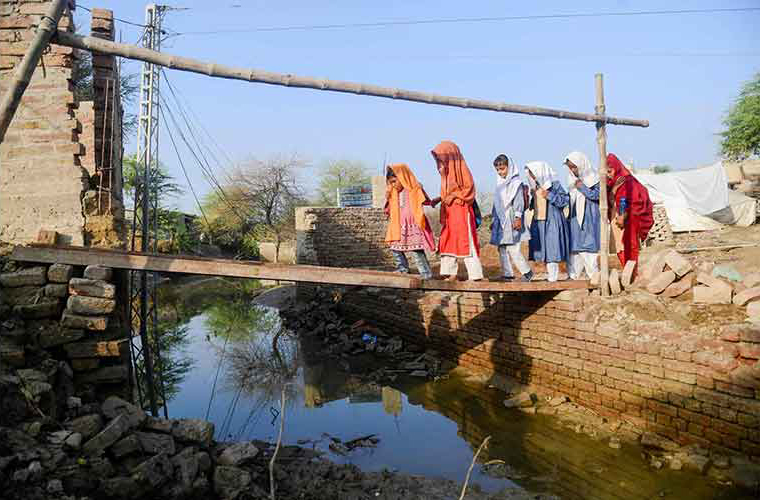Disclaimer: Website Under Maintenance: Our website is currently under maintenance. We apologize for any inconveniences.

It has been almost 13 years since the passage of the 18th constitutional amendment and the inclusion of Article 25-A, pledging free, compulsory, and quality education for every Pakistani child between the age of 5 and 16 years.
Pakistan is also a signatory to the Sustainable Development Goals (SDG 2030). Under SDG 4, i.e., equitable education, it is committed to ensuring 100 percent enrolment and retention by the year 2030.
However, despite these commitments, not much has changed for the children in the country. It is almost as if the state had never accepted the responsibility for a literate Pakistan.
Prior to Covid-19, there were an estimated 22.8 million out-of-school children in Pakistan, 77 percent of these OOSC hailed from rural areas; 54 percent of them were girls. It is important to highlight that 96 percent of the children living with various disabilities lack access to education.
In the aftermath of the pandemic, 930,000 students never returned to their classrooms, raising the number of OOSC by 4.5 percent. A dramatic fall in enrollment was also observed among 14-16-year-olds in the poorest households. The loss of learning was 50 percent worse for children belonging to underserved backgrounds.
Now, with the massive floods that have left over 16 million people displaced, Pakistan is faced with a herculean challenge to ensure that its already dismal education indicators do not slip further. It is estimated that among the 6 million displaced children, 3.5 million are students. The students in the lower socio-economic quintile whose access to formal education had previously been most affected by the pandemic are also the ones most impacted by the 2022 floods.
Pakistan ranks among the most vulnerable countries with regard to the impact of climate change. It is safe to assume that education will remain under similar threats of disruption for several years. In the face of this harsh reality, the state will have to make way for concrete, long-term planning that includes all stakeholders instead of quick fixes when it comes to education.
The entire system needs to be re-evaluated and locally informed solutions, tailored to the specific needs of each area need to be chalked out. This is our best bet to protect the future of millions of Pakistani children against the gaining effect of climate change.
The first step in this direction has to be a strong preparedness and disaster-risk management component inherent to the education system. This should include the ability to methodically and swiftly gather data on the extent of damage incurred by school infrastructure; the number of displaced children of school-going age and the number of teachers who can immediately resume duty.
Pakistan can rise above the multitude of challenges it faces today with a highly educated workforce. It is, therefore, time to stop making excuses, and acknowledge that the dream of a strong Pakistan can only ever be realised through a resilient and inclusive system of education.
Technical and financial support as well as sufficient autonomy must be extended to head teachers to develop and implement school-specific disaster response plans.
The oft-demanded strong interdepartmental and inter/intra-provincial coordination is key to the execution of such a preparedness and disaster-risk management component. The ministries and departments of education, planning and development, climate change and disaster management authorities must routinely exchange knowledge and information and evaluate progress against short-, medium- and long-term goals. These goals should be supported by adequate financial resources. Transparency and openness in all processes are key to a well-coordinated education response during emergencies.
Beyond emergencies, systemic changes must pave the way for a new generation of well-informed students who are aware of and able to take positive climate action. The most obvious step in this regard would be to introduce climate education in the school curricula at all levels.
Education sector plans developed by the provinces should include resilient education objectives along with implementation plans. The less obvious but equally important step is ensuring that every child receives the critical, potentially life-saving knowledge.
Special attention needs to be given to the most vulnerable groups, i.e., girls, children living with disabilities, transgender children and learners from other marginalised groups. The inclusive approach will in turn require support from the communities. Therefore, regular community engagement geared towards encouraging sustained education for all children of school-going age, especially the most vulnerable groups, is integral to any effort aimed at a shock-resilient education system.
Finally, parliamentary oversight is absolutely imperative to ensure uninterrupted and efficient implementation of policies as well as sufficient allocation of monetary resources. The latter is especially important since Pakistan's public investment in education is the lowest in South Asia.
It goes without saying that the best-laid plans cannot be executed if not backed by sufficient resource allocation. For this reason, when the state of Pakistan mobilises resources during and beyond emergencies, education needs to be prioritised at par with other developmental needs such as infrastructure.
Pakistan cannot rise above the multitude of challenges it faces today without a well-rounded, highly educated workforce. It is, therefore, time to stop making excuses and acknowledge that the dream of a strong Pakistan can only be realised through a resilient and inclusive system of education.
The writer is the national coordinator for Pakistan Coalition for Education and a Malala Fund education champion. She can be contacted at [email protected] & on Twitter @zehra2576
Source: https://www.thenews.com.pk/tns/detail/1028209-towards-a-climate-resilient-education-system